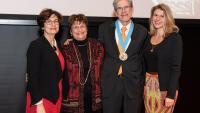Prestigious Calderone Prize Awarded to Julio Frenk

Public health’s most prestigious honor, the Frank A. Calderone Prize, was presented to Julio Frenk, president of the University of Miami, at a ceremony on November 14 at the Roy and Diana Vagelos Education Center. Since 1986, the Calderone Prize has recognized individuals who have made a transformational contribution to the field.
A public health-trained physician, Frenk founded Mexico’s National institute of Public Health. At the World Health Organization, he served as executive director in charge of Evidence and Information for Policy. As minister of health for Mexico, he dramatically expanded access to healthcare. He went on to serve as senior fellow in the global health program of the Bill & Melinda Gates Foundation and dean of the Harvard T.H. Chan School of Public Health, where he contributed to advances in public health education, a goal he continues to pursue today.
Linda P. Fried, Dean of the Columbia Mailman School of Public Health, presented the award, noting several similarities between the careers of Frenk and the Prize’s namesake, Frank Calderone, who also started his career serving his community and went on to work on global health issues. His daughter, Francesca Calderone-Steichen, also gave remarks, which recognized the School’s Calderone Junior Faculty Awardees.
Dean Fried called Frenk an exemplar of public health, inclusive of its many facets. “With compassion and commitment, Dr. Frank has truly changed public health policy, education, practice, scholarship, and the opportunity for health equity around the world.”
After accepting the Calderone Prize medal, Frenk delivered an original lecture entitled, “Health Transitions: Progress or Paralysis?” that highlighted the important role universities play in protecting societal progress to improve public health. He outlined four pillars in the evolution of health systems: the recognition of health as a right, universal healthcare, the integration of public health and clinical care, and transparency and accountability. Frenk warned that progress isn’t always linear, and universities must protect against emergent ideologies that threaten to reverse these gains. “At a time when the credibility of institutions and expertise is often questioned, we become exemplary as we uphold the value of basing decisions on rigorous evidence, rather than ideological prejudice, and as we reaffirm our commitment to the pursuit of truth, no matter how complex and contradictory it may be.”
Download a copy of his lecture, and watch the video of his presentation below.